Daughter Of Prisoner On Death Row In Iran Pleads For Action
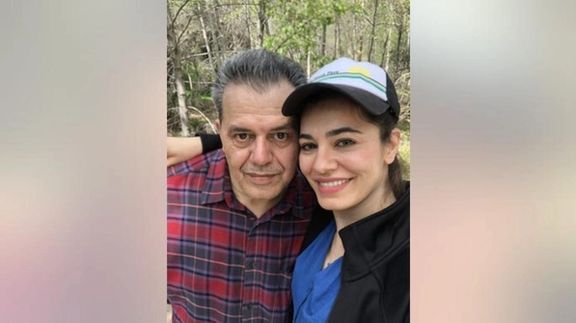
The daughter of a German-Iranian US citizen who has been sentenced to death in Iran has called on Washington and Berlin to “take action” and save her father.

The daughter of a German-Iranian US citizen who has been sentenced to death in Iran has called on Washington and Berlin to “take action” and save her father.
Jamshid Sharmahd, a 68-year-old software developer and California resident, was allegedly abducted during a visit to the United Arab Emirates in 2020 and forcibly taken to Iran.
In April, the Iranian judiciary sentenced him to death on charges of "spreading corruption on Earth," a verdict upheld by Iran's Supreme Court.
His family vehemently denies the allegations, and Amnesty International has condemned the trial as a sham.
At the end of last week, German officials disclosed that Foreign Minister Annalena Baerbock had held discussions about Germans detained in Iran with her Tehran counterpart, Hossein Amir-Abdollahian.
On Sunday, Jamshid’s daughter Gazelle Sharmahd responded, tweeting: “I have requested an input from the German Government regarding what was discussed about the hostages in Iran, in particular about my father Jamshid Sharmahd.”
In remarks targeted at US President Joe Biden, she said: “What are you doing for the US hostages after you handed the Islamic regime $6 billion, and still couldn’t save all US nationals like my dad. We are still waiting for you to take action. Action that won’t further threaten my dad‘s life and won’t further empower his kidnappers.”
She earlier expressed frustration with the passing of responsibility between Germany and the US, stating, "The issue is tossed back and forth, with each side claiming 'not my citizen,' 'not my jurisdiction.' And we're not getting through to them."
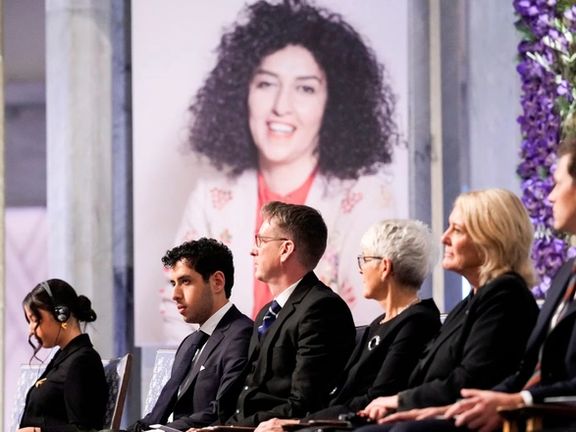
Nobel Peace Prize winner Narges Mohammadi, imprisoned in Tehran, has criticized Western governments for their half-hearted support for Iranians who fight for democracy and human rights.
In her acceptance speech –sent from the notorious Evin prison, read by her teenage daughter in Oslo– Mohammadi said the Islamic Republic is in a state of “unstable equilibrium” with very little popular support, and will give way to democracy sooner rather than later.
“But the reality is,” she added, “that [foreign] governments and the UN have not had the conviction, the practical coherence, and the proactive approach that seemed necessary and fitting for the kind of support that wills the victory of the people of Iran.”
Iranian dissidents often cite lack of foreign support as a contributing factor to their nonsuccess in getting rid of the Islamic Republic. When it comes to defining the nature and the scope of such support, Western governments are mostly unclear and divided, dissidents argue.
“Western governments should not delay democracy and human rights by adopting confused strategies that are concerned with the continuation of the Islamic Republic's rule,” Mohammadi said.
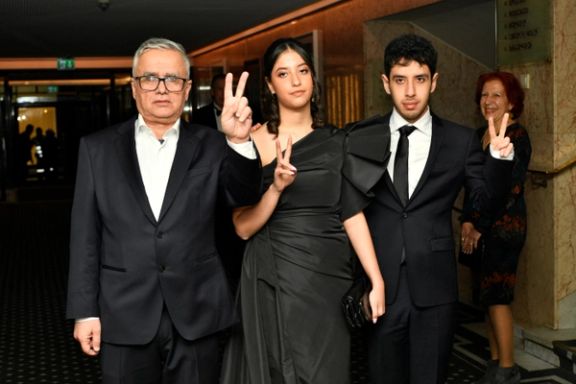
Her words seem to be directed at Western leaders who consider it to be wiser –or see no alternative but– to deal with those who rule Iran as long as they’re in control.
“The policies and strategies of Western governments have been too superficial to give priority to the will of the Iranian people to achieve their goals,” Mohammadi said.
The Norwegian Nobel committee awarded Mohammadi for her "fight against oppression of women in Iran" and the promotion of human rights for all, in what has been read by some as a decision to aggravate the regime in Tehran.
Narges Mohammadi has spent much of the last decade in prison, serving multiple sentences on charges including spreading propaganda against the Islamic Republic. She was symbolically represented on stage in Oslo by a portrait of her and an empty chair.
Mohammadi’s husband, Taghi Rahmani, and their twins –who live in exile in France– attended and received the reward on her behalf.
The event, supposedly a universal source of joy for Iranians, became yet another trigger for heated debate on social media when Rahmani said in an interview on the sidelines of the ceremony that Iranians inside Iran do not want sudden change.
Some read this as a statement in support of Reformists and attacked Rahmani, accusing him of betraying his wife’s suffering and promoting the regime’s agenda.
Others, including some prominent voices on social media whose loved ones have been killed by the regime in recent years, created a double-hashtag (which would translate in English as #DeathToIslamicRepublic and #DeathToReformMovement) with no reference to Rahmani but coinciding with the event.
Taghi Rahmani, a renowned journalist and political activist, had spent more than 13 years in prison before he left Iran in 2012. He’s been a vocal critic of the Islamic Republic for many years but believes any sudden political change in Iran to be a “strategic mistake.”
Unlike his Nobel winning wife, Rahmani used his platform Sunday to decry foreign influence, citing the examples of the 2003 invasion of Iraq and President Donald Trump’s unilateral abandonment of the JCPOA nuclear agreement with Iran.
Mohammadi, although vague in her language, seemed to be welcoming –or even encouraging– outside help in her Nobel speech.
“It is expected that the global civil society provides more tangible support to the Iranian people's efforts towards democratic and non-violent transition to achieve peace, democracy, and human rights.”
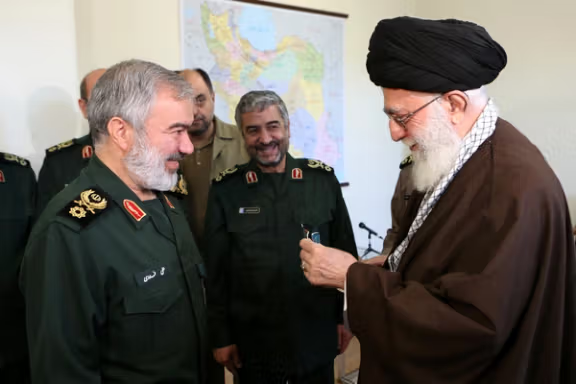
The IRGC is indifferent to who becomes Iran's next president or the outcome of parliamentary elections in March, its deputy commander Ali Fadavi has said.
During a speech at Jondi Shapur University in Ahvaz, Khuzestan Province, Fadavi emphasized that the crucial aspect for the IRGC is that the Iranian people heed Supreme Leader Ali Khamenei's directive to participate in the elections.
The implications of Fadavi's statement remain unclear. It could suggest that, like many Iranian media outlets and politicians, the Guards recognize the futility of holding elections that lack freedom, fairness, and competitiveness. Alternatively, it might indicate that the IRGC is withholding support for any specific candidate.
Fadavi's subsequent remark, "The IRGC is not going to sacrifice its reputation for any individual," implies a lack of faith in the merits of any candidate and underscores the IRGC's perceived supremacy over Iranian politicians. He asserted that while individuals may sacrifice themselves for the IRGC, the organization will not sacrifice itself for anyone.
Elsewhere in his speech, Fadavi elaborated that "We will not spend anything for anyone who would want to become the President or a member of the parliament, because the issue is not important at all."
During the past week, as the date for the parliamentary (Majles) elections gets closer, many politicians have said that Iranians do not care about the upcoming elections and that the turnout could be even lower than in the 2020 parliamentary vote and the 2021 presidential elections which were the lowest during the past 45 years.
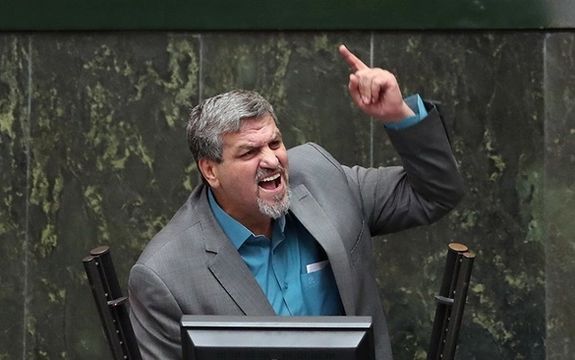
Former reformist lawmaker Mostafa Kavakebian said in his Student Day speech that most university students do not know that this is an election year. Earlier, prominent conservative politician Hamid Reza Taraghi had said the same thing about the population as a whole.
While moderate and pro-reform politicians in Iran have lost all hopes in the competitiveness of the upcoming election, only hardliners and ultraconservatives appear to take it seriously.
Even within the conservative camp, divisions are so deep and widespread that moderate and traditional conservatives such as former Majles Speaker Larijani and Expediency Council member Mohammad Reza Bahonar are not so sure that they could get through biased vetting by the Guardian Council. Of the two politicians, the former is not running, and the latter has openly said that he fears disqualification.
Meanwhile, conservative commentator Mohammad Mohajeri has said that major conservative groups are not so keen to forge strong alliances ahead of the elections as they are almost certain that the ultraconservative Paydari Party will betray them at the last moment as it has done in previous elections. As a result, every major hardline conservative group and party is likely to present its own separate list of candidates.
This would mean an even lower turnout than previous rounds and less credibility for the Majles, as those who eventually win the elections are likely to win smaller number of votes. Without a strong coalition to rally voters behind a group of candidates, few are likely to win more than a few hundred thousand votes even in big cities such as Tehran, Mashhad, and Esfahan.
Mohajeri further said that the main competition in the parliamentary elections will take place between Paydari and the supporters of current Majles Speaker Mohammad Bagher Ghalibaf. He added that regardless of reports about a coalition between Ghalibaf and Paydari, the former is making preparations for a campaign without a coalition, presumably due to Paydari's unpredictability.
Meanwhile, speaking about the possibility of former President Hassan Rouhani uniting low-key moderate and reformist candidates to win a sizeable minority in the next Majles, conservative politician Ali Yousefpour expressed doubts. He argued that Rouhani has lost his credibility among the voters due to his failure to sort out the country's economic problems during his presidency.
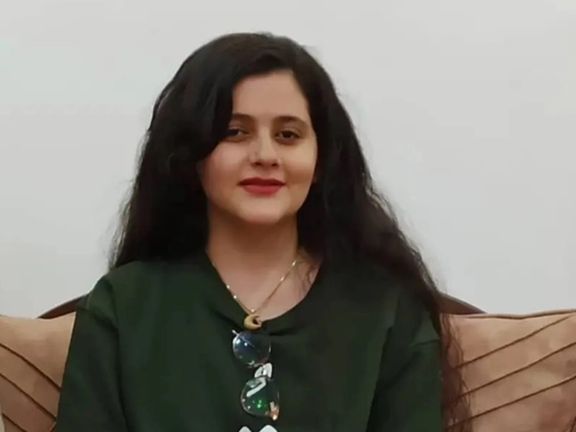
Mojgan Eftekhari, the mother of Mahsa Amini, strongly denounced the authorities for obstructing their family's departure for France to receive the Sakharov Prize.
On Friday, as Amjad Amini, Mojgan Eftekhari, and Ashkan Amini, the father, mother, and brother of Mahsa Amini, were en route to France for the Sakharov Prize ceremony, they were informed at the airport about the travel prohibition, with their passports confiscated.
Mahsa Amini, a 22-year-old woman, was detained by Iran's morality police in mid-September 2022, leading to her tragic death within three days of critical head injuries, sparking nationwide protests.
Expressing her frustration on Instagram, Eftekhari questioned the government's ignorance, stating, "How clueless the rulers are, not realizing the impact of Mahsa's name?" She labeled the Iranian officials as "deceptive rulers," accusing them of consistently attempting to erase Mahsa's indelible memory through deceitful maneuvers.
Earlier, Roberta Metsola, the President of the European Parliament, urged the Islamic Republic to lift the travel ban imposed on Mahsa Amini's parents and brother.
The European Union declared on October 19 that Mahsa Amini and the Women, Life, Freedom movement would be recipients of the Sakharov Prize.
The Amini family has faced heightened security pressure since Mahsa's death in the custody of the morality police, coinciding with the onset of the Iranian people's uprising against the Islamic Republic.
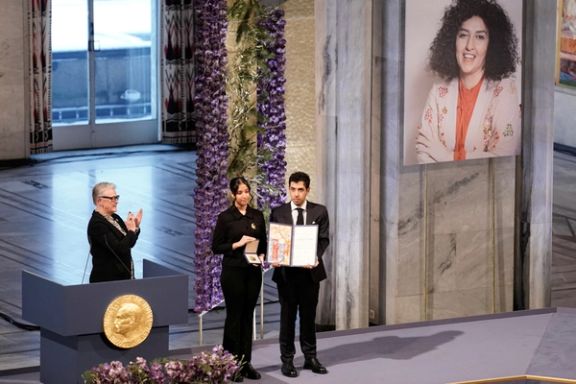
The Nobel Peace Prize ceremony honoring Iranian activist Nargess Mohammadi took place in the Norwegian capital of Oslo while she is on hunger strike in prison.
Mohammadi, a human rights activist currently incarcerated, was absent from the ceremony, with her family accepting the award on her behalf.
The Nobel Peace Prize ceremony on Sunday coincided with Human Rights Day. On October 6, as announced by the Nobel Committee, Mohammadi was awarded the Nobel Peace Prize for 2023 "due to her struggle against injustice towards Iranian women and her efforts to advance human rights and freedom for all."
In the absence of the imprisoned human rights activist, the prize was received by her husband, Taqi Rahmani, and their twin children, Kiana and Ali.
In a pre-ceremony interview with Iran International, Ali Rahmani stated that his mother, who is currently in prison, should have been present at the award ceremony. He and his sister, Kiana, aim to represent their mother's voice.
Kiana also expressed admiration for individuals of similar age “who took to the streets and sacrificed their lives for the cause.” She emphasized that the Nobel Peace Prize is not only for her mother but also for all Iranian women.
Narges Mohammadi, born in 1972 in Zanjan, holds a degree in applied physics. She commenced civil and political activities during her university years. Over the years, she has received several international awards, including the Sakharov Prize from the American Physical Society in 2018, the International Press Freedom Award in 2016, and the Alexander Langer Award in 2009.
In recent years, Mohammadi has faced multiple arrests, trials, and many years in prison for her human rights activities. She was last arrested in 2021 and has been in Evin Prison since then.
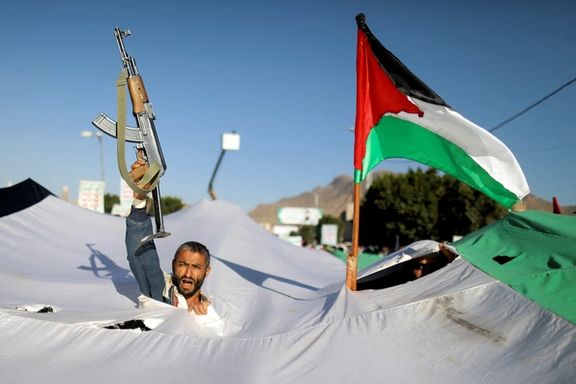
After several weeks of sporadic attacks on Red Sea shipping, Iran-backed Houthis of Yemen have threatened all ships in addition to US and Israeli vessels.
Houthis’ Information Minister Dhaif Allah (Dhaifullah) Al-Shami said Sunday that their forces will attack sensitive targets of Israel and US in the region if they move to act against the Houthis. Bragging about their attacks on vessels, he claimed that these are in response to Israel's offensive in Gaza.
Palestinian Islamist militia Hamas, another Iran-backed group, declared war on Israel on October 7 in a surprise attack that they codenamed Operation Al-Aqsa Flood, killing over 1,200, mostly civilians and taking about 250 hostages. In retaliation, Israel has been pounding the enclave to uproot Hamas, which has made the war exceedingly bloody hiding deep among the civilian population and underneath the coastal sliver’s non-military facilities.
Al-Shami's remarks came a day after General Yahya Saree, the military spokesman for Houthi rebels, warned that they would target all ships heading to Israel, regardless of their nationality. He also warned all international shipping companies against dealing with Israeli ports. "If Gaza does not receive the food and medicine it needs, all ships in the Red Sea bound for Israeli ports, regardless of their nationality, will become a target for our armed forces."
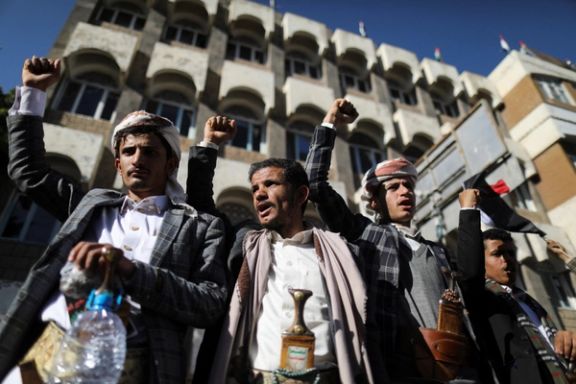
The Houthis have attacked and seized several Israeli-linked ships in the Red Sea and its Bab al-Mandab strait, a sea lane through which much of the world's oil is shipped, and fired ballistic missiles and armed drones at Israel.
According to Israeli media, Prime Minister Benjamin Netanyahu has reportedly told US President Joe Biden and German Chancellor Olaf Scholz that if they do not take military action against the Houthis soon, Israel will. The US government’s reaction to attacks on vessels in the Red Sea has been a mixture of blaming Iran and downplaying the threat to the US Navy.
The New York Times reported on Saturday that senior Israeli defense officials have intelligence that Iran is urging their regional allies, such as Hezbollah and the Houthis, to increase their attacks and pressures against Israel.
Al-Shami described the threat by the Houthis’ military spokesman as “historic,” claiming that targeting ships belonging to other countries is the next phase to put pressure on Israel after the first phase of targeting Israeli-linked ships. “This statement is a historic declaration for Yemen; a country that has been under siege and attack, facing ruthless and rebellious forces for nine years. Yet today, it rises in support and assistance to the oppressed in Gaza and throughout Palestine.”
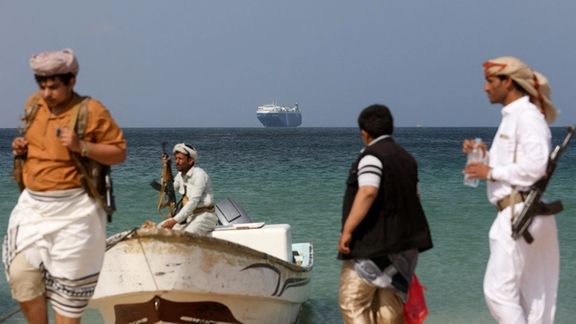
Earlier in the day, France’s defense ministry said a French warship operating in the Red Sea has shot down two drones that were launched at it from the Yemen coast. On Friday, British officials warned shipping in the Red Sea to “exercise caution.” In another one of the latest incidents, three commercial vessels came under attack in international waters last week, prompting a US Navy destroyer to intervene. The Houthis, which rule much of Yemen and its Red Sea coast, also seized last month a British-owned cargo ship that had links with an Israeli company.
The Houthis are one of several Iran-backed militant groups in the Middle East. They have been effectively in a state of war with Saudi Arabia since 2015 and have claimed support for Palestinians since the Hamas terror attack on Israel on October 7. Iran supports Hamas but says it did not play any role in the Islamist militants' terror attack that triggered the current crisis. Tehran also denies involvement in the recent attacks on vessels in the Red Sea. Iran also backs the Hezbollah, a Lebanese militant group that has deep ties with Hamas and Islamic Jihad, another Palestinian faction in Gaza that is also backed by Iran.
Iran's current war strategy is employing proxy forces to target Israel, Israeli assets, and US military installations in the region. Since the October 7 attack, Tehran has been warning of the spillover of the conflict in case of a regional escalation, but at the same time cheers attacks against Israel and the United States.